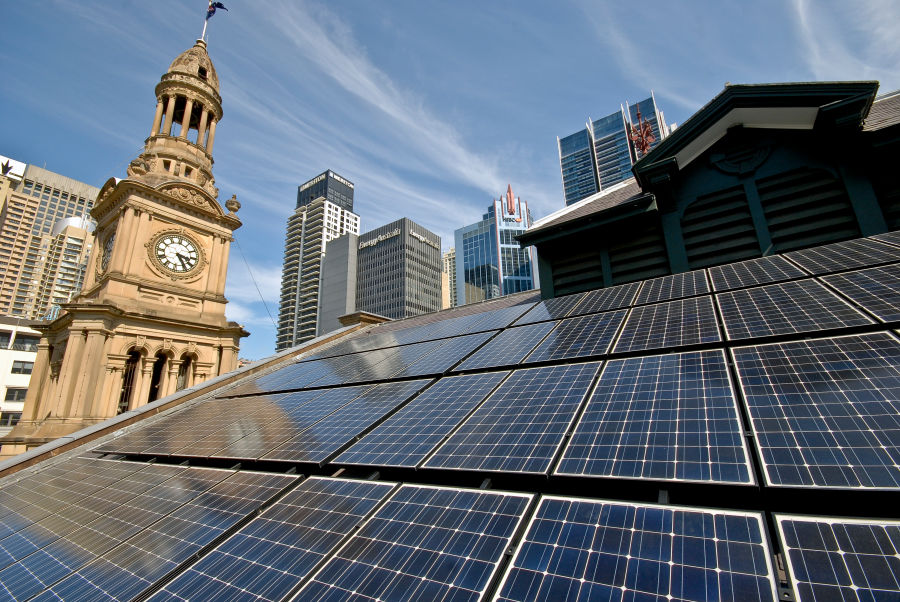All of Sydney’s operations – including street lights, pools, sports fields, depots, buildings and the historic Sydney Town Hall – will now be run on 100% renewable electricity sourced from local solar and wind projects. The switch is part of a AU$60 million (US$41.5 million) deal with electricity retailer Flow Power, the biggest standalone green energy deal of its kind by a council in Australia.
The deal is projected to save the city up to half a million dollars a year over the next 10 years, and reduce carbon emissions by around 20,000 tonnes a year – the equivalent to the power consumption of more than 6,000 households. The city calculates that the new deal will see it reach its 2030 of reducing emissions by 70% by 2024, six years early.
“We are in the middle of a climate emergency. If we are to reduce emissions and grow the green power sector, all levels of government must urgently transition to renewable energy,” Lord Mayor Clover Moore said on Wednesday.
The power purchase agreement will see the city source renewable energy from the 120 MW Bomen Solar Farm in Wagga Wagga, the 270 MW Sapphire Wind Farm near Inverell, and the 3 MW Shoalhaven Solar Farm, a not-for profit, community-owned solar scheme near Nowra on the southeast New South Wales coast. The deal will see three-quarters of the city’s power sourced from wind generation and one-quarter from solar.
“This is a landmark achievement for the city of Sydney. If organizations can follow in the city’s footsteps, a net-zero carbon future is achievable,” Flow Power CEO Matthew van der Linden said. “The city is directly matched to these renewable projects, a move that supports the integration of renewables into the system.”
One of the first projects in Australia to install bifacial panels, the Bomen Solar Farm began exporting to the grid in March. The project was acquired last year by electricity network infrastructure owner Spark Infrastructure, in the company’s major strategic shift towards owning renewable energy generation assets. In addition to the PPA with Flow Power, the Bomen project has a second PPA with Westpac, as part of the bank’s commitment to a 100% renewables target.
The second solar asset cover by the deal, the Shoalhaven solar project is being developed by Flow Power in partnership with local community group Repower Shoalhaven, a not for profit volunteer community enterprise that develops community solar projects. With a construction cost of close to AU$5 million, the coastal solar farm will deliver additional investment to the region and provide local employment opportunities during construction and operation. The project will generate enough energy to power close to 1,000 New South Wales homes.
“Shoalhaven solar farm could not have become operational without the city’s investment. By partnering with this project, we’re creating local jobs and helping the renewables sector grow,” said member Bob Hayward, on behalf of Repower Shoalhaven.
Efficiency initiatives
Since 2016, the city has been investing in energy efficiency initiatives, such as installing rooftop solar and LED lights, which has translated into significant savings for ratepayers. Replacing 6,500 street lights with LEDs, for example, has saved ratepayers AU$800,000 a year.
The city has also installed solar panels on more than 30 of its office buildings, pools, libraries and community centers, including Sydney Markets (8,594 panels), Andrew (Boy) Charlton Pool (85 panels), Sydney Town Hall (240 panels), Redfern Oval (211 panels), the Australia Post building on Cleveland Street (1000+ panels), the Surry Hills Library (32 panels), as well as the International Convention Centre Sydney in Darling Harbour, which is home to a community-funded 520 kW solar PV installation. At the Darling Harbour array, the solar panels are owned by members of the general public.
By mid-2021, the city plans to have more than 7,800 solar panels generating power for its buildings. It has also partnered with Ausgrid to fast-track the upgrade of 9,500 utility-owned street lights to LED, which will save around AU$1 million in annual maintenance and energy costs.
While the city of Sydney was the first local government in Australia to achieve carbon neutral certification in 2011, Melbourne was the first Australian capital to become powered by 100% renewable energy. On Wednesday, the city of Sydney was joined by the city of Adelaide in announcing a complete shift to 100% renewable energy.
This content is protected by copyright and may not be reused. If you want to cooperate with us and would like to reuse some of our content, please contact: editors@pv-magazine.com.




1 comment
By submitting this form you agree to pv magazine using your data for the purposes of publishing your comment.
Your personal data will only be disclosed or otherwise transmitted to third parties for the purposes of spam filtering or if this is necessary for technical maintenance of the website. Any other transfer to third parties will not take place unless this is justified on the basis of applicable data protection regulations or if pv magazine is legally obliged to do so.
You may revoke this consent at any time with effect for the future, in which case your personal data will be deleted immediately. Otherwise, your data will be deleted if pv magazine has processed your request or the purpose of data storage is fulfilled.
Further information on data privacy can be found in our Data Protection Policy.